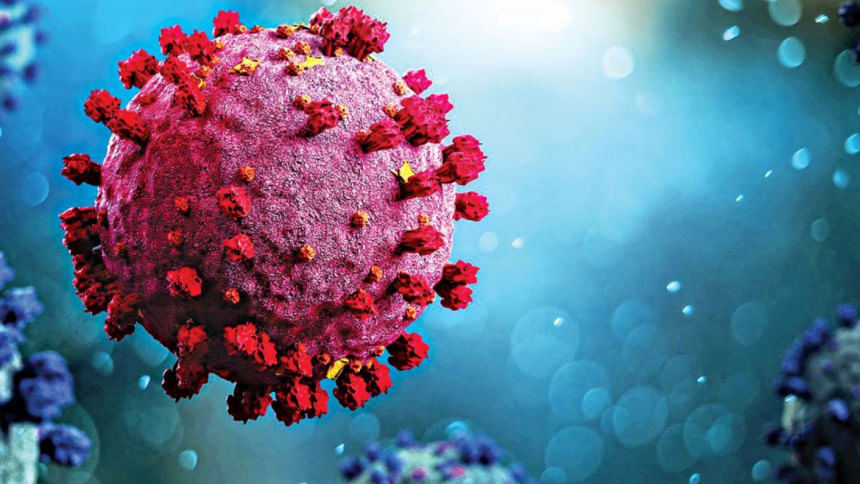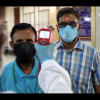Covid BF.7 subvariant: What we know and what to do

The BF.7 is one of the concerning sub-variants of Omicron causing the current devastating wave of Covid-19 pandemic in China.
One of the four Chinese visitors who arrived in Bangladesh recently, was found to be infected with BF.7. All the four passengers had negative results in pre-flight Covid test. However, one of them tested positive for Covid-19 in a rapid antigen test on arrival at the airport. Later, the gene sequencing confirmed the presence of BF.7 variant in the passenger's sample.
This news has created panic among people about Covid-19, once again. Misinformation is also sprawling around. Naturally, several questions have emerged.
Will there be a new Covid outbreak in the country? Is BF.7 highly contagious and more virulent than the earlier variants? Can BF.7 infection cause severe Covid? Do vaccinated people have protection from BF.7 infection? What measures should be taken to stop the entry of this new variant in our country? Should we impose new Covid rules now?
Firstly, the BF.7 sub-variant is two to three times more infectious than the original Omicron. The World Health Organization has listed this variant as a "Variant of Concern". This means that BF.7 should be monitored seriously and if necessary, new controlling measures should be imposed.
Is the BF.7 variant solely responsible for the ongoing unprecedented pandemic wave in China? Before detection in China, the BF.7 variant was found in several European countries in August, when infection was declining in those regions.
The Chinese government has been following a zero-Covid policy since the beginning of the pandemic. This action prevented widespread coronavirus infection in mainland China during 2020 and 2021. As a result, no mass immunity has been developed against Covid among the large population of the country. But recently, when the zero-Covid policy was relaxed in China, the infection spread rapidly due to the BF.7 sub-variant across mainland.
On the other hand, Omicron infection has been widespread in most parts of the world, including Bangladesh, resulting in mass immunity against this variant. Therefore, it is expected that, even if the BF.7 sub-variant enters Bangladesh, there is little chance of any major disaster. Based on observations, BF.7 is more contagious than other sub-variants of Omicron, but less virulent. Infection with BF.7 has a much lower risk of hospitalisation and severe Covid. However, BF.7 infection can be severe in those with high blood pressure, kidney diseases, diabetes or other comorbidities and in those aged over sixties.
People who have received two doses of the Covid vaccine or have previously been infected with the disease can also be infected with any of the variants of the coronavirus, including BF.7. Current Covid vaccines have been developed targeting the original Wuhan variant. Omicron variants have undergone many mutations. That is why vaccine-induced immunity is inefficient to prevent Omicron infection. However, the adaptive immunity that is developed in the body by vaccine or natural infection helps our immune system to fight against any coronavirus variants. As a result, vaccinated people when infected, develop mild symptoms and recover within 5-7 days. Therefore, everyone is strongly advised to get at least two shots of the vaccine.
Now the most important question is how to stop the entry of BF.7 in our country? We now know that it is almost impossible to stop the spread of Covid variants from one country to another. However, this spread can be slowed down by imposing various control measures. Since the BF.7 is not a lethal variant, no drastic measure is needed to stop its entry.
However, pre-flight Covid test should be made mandatory for all those arriving from countries where the BF.7 transmission is ongoing. Wearing masks on flights should be mandatory. An onsite rapid antigen test upon arrival at the airport should be mandatory for those who show symptoms. If the test is positive, an institutional quarantine for 7 days should be recommended, and sample should be sequenced for variant confirmation. The US, UK and Germany are contemplating these approaches.
Another point to consider is whether there is a need to re-introduce Covid rules in the country now? There is no logical reason to introduce countrywide Covid rules at the moment. In my opinion, it is important to implement the Covid rules in the hospitals with immediate effect. Wearing masks should be made mandatory for all health care providers in the hospitals. This will greatly reduce the spread of coronavirus to patients from healthcare workers and vice versa. Hospitalised patients are most vulnerable. This strategy is being implemented by the UK's National Health Service.
Now the question is how would one know that he or she is infected with the new subvariant? The most common symptoms of the BF.7 infection are sore throat, runny nose, sneezing with slight fever, headache and gut problems. Plainly, the symptoms of BF.7 infection are similar to those of common flu. So, if you have these symptoms, isolate yourself from others. If symptoms do not subside within five days, get a Covid test done. No medication is required except paracetamol or antihistamines. BF.7 infection usually goes away spontaneously within 5-7 days without complications. However, those with comorbidities or those aged over sixty should consult a doctor to avoid complications.
There is nothing to worry about the BF.7 right now. It is very unlikely that we will witness another big pandemic wave caused by the new variant in our country.
Dr Khondoker Mehedi Akram is the senior research associate of The University of Sheffield in UK.

 For all latest news, follow The Daily Star's Google News channel.
For all latest news, follow The Daily Star's Google News channel. 








Comments